
The Challenger expedition of 1872–1876 was a scientific programme that made many discoveries to lay the foundation of oceanography. The expedition was named after the naval vessel that undertook the trip, HMS Challenger.
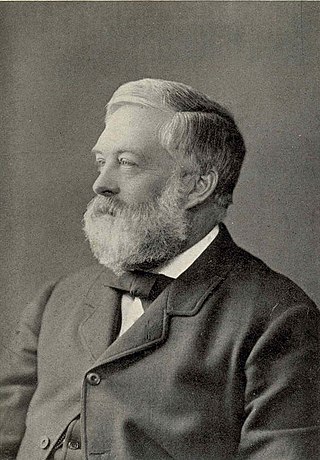
Sir Charles Wyville Thomson was a Scottish natural historian and marine zoologist. He served as the chief scientist on the Challenger expedition; his work there revolutionized oceanography and led to his being knighted.

HMS Challenger was a Pearl-class corvette of the Royal Navy launched on 13 February 1858 at the Woolwich Dockyard. She served the flagship of the Australia Station between 1866 and 1870.

The Reverend Thomas Roscoe Rede Stebbing was a British zoologist, who described himself as "a serf to natural history, principally employed about Crustacea". Educated in London and Oxford, he only took to natural history in his thirties, having worked as a teacher until then. Although an ordained Anglican priest, Stebbing promoted Darwinism in a number of popular works, and was banned from preaching as a result. His scientific works mostly concerned crustaceans, especially the Amphipoda and Isopoda, the most notable being his work on the amphipods of the Challenger expedition.
Edward John Miers FZS FLS was a British zoologist and curator of the crustacean collection at the Natural History Museum in London. He contributed to the scientific reports from the Challenger expedition of 1872–1876, and described 32 new genera and at least 260 new species and subspecies of decapod crustaceans, along with four genera and 72 new species in other orders.
Typhlomangelia cariosa is a species of sea snail, a marine gastropod mollusk in the family Borsoniidae.
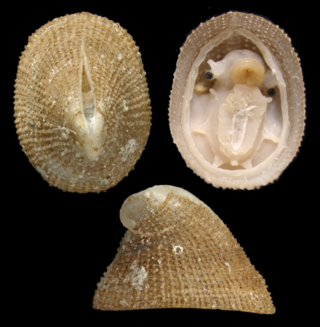
Puncturella agger is a species of sea snail, a marine gastropod mollusk in the family Fissurellidae, the keyhole limpets.
Coralliophila aedonia is a species of sea snail, a marine gastropod mollusk in the family Muricidae, the murex snails or rock snails.
Crisilla quisquiliarum is a species of minute sea snail, a marine gastropod mollusk or micromollusk in the family Rissoidae.
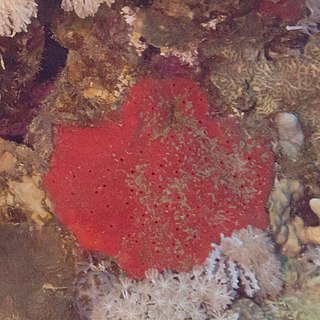
Dragmacidon lunaecharta, also known as the red ball sponge or red boring sponge, is a species of sea sponge found in the western Atlantic Ocean. It feeds on plankton. These sponges do not attach themselves to rocks or the sea floor but drift in water currents. Its main predators are sea slugs. It has been kept in home aquariums.
Turbonilla kymatoessa is a species of sea snail, a marine gastropod mollusk in the family Pyramidellidae, the pyrams and their allies.
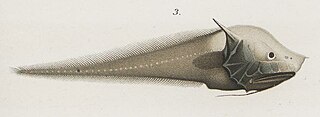
The bony-eared assfish is a bathypelagic species of cusk-eel found in tropical and sub-tropical oceans at depths of from 1,171 to 4,415 metres. It has been found as far north as Queen Charlotte Sound off British Columbia's coast. This species grows to a length of 37.5 centimetres (14.8 in) SL. The larvae are similar in overall form to the related gargoyle cusk, but have elongated 3rd, 4th, and 5th pectoral-fin rays.

Caulophacus elegans is a species of glass sponges belonging to the subfamily Lanuginellinae. The type specimen has been found in Central Kuroshio Current, near Japan.
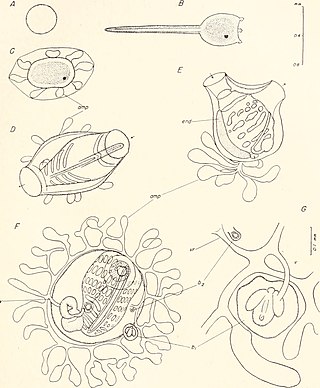
Symplegma viride is a species of ascidian tunicates in the family Styelidae.
Stachyptilum is a genus in the family Stachyptilidae. The genus contains bioluminescent species.
Geodia cooksoni is a sponge species in the family Geodiidae. The species was first described by British scientist William Johnson Sollas in 1888 under the name Cydonium cooksoni. It is found in the waters of the Pacific Ocean around the Galápagos Islands.

Pannychia moseleyi is a sea cucumber in the family Laetmogonidae. It was first described by Johan Hjalmar Théel in 1882. It can be up to 200 mm long and 40 mm wide. It occurs in the benthic zone at depths greater than 400 m.
Polyeunoa is a genus of marine annelids in the family Polynoidae. The genus contains two species, one from the Indian Ocean and the other widespread in the south-west Atlantic ocean and the Southern Ocean.
Dasychalina fragilis is a species of sponge described by Stuart Oliver Ridley and Arthur Dendy in 1886. Dasychalina fragilis belongs to the genus Dasychalina and the family Niphatidae.

Doris kerguelenensis is a species of sea slug, a dorid nudibranch, a marine gastropod mollusc in the family Dorididae.










